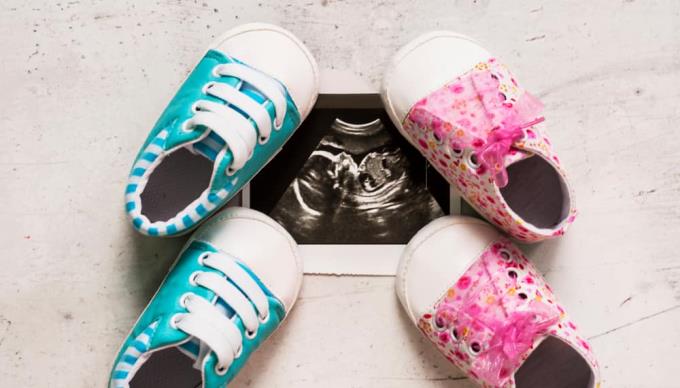The 34-week pregnancy is in the "sprinting" stage and just a little while longer, the mother can hold her baby in her lap. While waiting for that happy moment, you should be mentally prepared to welcome you to be born at any time. Especially with twins, it is necessary to pay more attention to the changes in the body, as well as the signs of the fetus for the best adaptation.
Unlike single pregnancies, women with twins are at a higher risk of health. Accordingly, this risk is proportional to the development of the fetus in the womb. One of the most common complications of twins is preterm birth. It is estimated that less than 50% of twins are born at more than 38 weeks gestation .
Preterm birth affects the digestion of food, as well as leaves behind long-term complications such as impaired vision, hearing loss and a lack of cognitive skills in the baby. What's more, the risk of stillbirth at twins is 13 times higher than normal, and mothers must at least give birth at 37 weeks to avoid this.
To ensure a safe pregnancy, you can refer to the following article to better understand the problem of 34 week twins.
Answer: What changes do 34 week old twins have?
This time, the fetus has entered the acceleration phase, so the baby's weight has increased significantly. Because the pregnancy is larger, the space in the uterus seems to be narrowed, there is not much room for the baby to freely "struggle" as before, but the baby can still pedal normally. The first part of the fetus is bent slightly to prepare for delivery .
At 34 weeks gestation, the baby has also completed most of the functions and organs in the body, only the lungs cannot function and the skin does not have the color as at birth.
Through ultrasound imaging, the parents will most clearly see the development of the twins. Through the screen, sometimes you will be surprised to see your baby smile (this is the baby is training facial muscles and reacting to external influences) or the thinning ends of their hair too!
The position of the fetus will be continuously monitored by a doctor from week 34 onwards. In the case of the ideal pregnancy, it is possible to have a normal birth, but if it is reversed your doctor may recommend a cesarean section .
Fetal size at 34 weeks

At this week of gestation, your baby is about the size of a melon with an average weight of about 2.2kg and a length of about 45cm.
Let's talk a little more about the changes of the 34-week pregnancy, at this point the baby's intestines are already filled with gum, sticky as tar. There are cases where the baby has a bowel movement right in the womb, this is a sign that the fetus has a problem. If this happens, the amniotic fluid will turn a bluish color. So, if your amniotic fluid ruptures and you see this manifestation, you should immediately notify your doctor to check it out!
Changes of pregnant mother during 34 weeks of pregnancy
In the third trimester, expectant mothers will have physical and mental changes, as follows:
1. Physiological changes
From this stage, the pregnant mother will not see as clearly as before. However, this symptom should end soon after birth. To improve, you can add vision-friendly foods.
The large belly size makes you can only lie on your side, plus the pain in the hips and thighs prolongs, making pregnant women fall into a state of chronic insomnia.
Swollen limbs caused by fluid accumulation in body tissues make walking more difficult.
If the fetus is in the correct position, the mother will find it easier to breathe, the lungs and diaphragm also dilate a little and move to the old position.
The eighth month is when pregnant mothers often have to deal with constipation during pregnancy , flatulence, indigestion. Therefore, in addition to drinking plenty of water and adding appropriate fruits and vegetables, you should pay more attention to the foods you consume.
Near the destination, pregnant mother will face false labor pain that makes you feel confused and worried. This phenomenon is called physiological contractions or Braxton - Hicks contractions. Features of this contraction usually appear suddenly about 30 seconds when pregnant women feel tired, dehydrated, and walk a lot. Although painless, these contractions make you feel tight in your lower abdomen.
In addition to the above problems, pregnant mothers may also face with rats , difficulty breathing or increased vaginal discharge due to hormone changes.
2. Psychological changes
It's almost time for labor, you seem impatient and just want a few weeks left to disappear in the blink of an eye. This may stem from the fact that you do not want to experience more back pain with a feeling of "half alive" or ugly stretch marks appear more and more ...
The time left is so short that you startled suddenly realize you cannot prepare everything properly before welcoming the two angels into your life. Do not worry too much, but try to share everything with relatives, especially your husband.
Twins ultrasound for 34 weeks

In this "sprint" period, pregnant mothers need to conduct ultrasound more often to monitor the stability of the fetus. Through this way, your doctor can determine and give accurate analysis to make your birthing process easier. Along with that, the pregnant mother will be asked to perform some specific tests to avoid the appearance of bad complications.
Many mothers also wonder if it is safe to give birth from 34 weeks of pregnancy? The answer is that having a baby at any time before 37 weeks is classified as preterm . If the unfortunate has to give birth at this time, the fetus needs special care. Because, at this time, the child's respiratory activity as well as the ability to regulate body temperature is not good. The time your baby is in incubator is expected to last until the baby reaches 38 weeks gestation.
According to experts, the best time to have twins should be between 34–39 weeks of pregnancy. However, this depends on many factors, especially whether the twins have the same placenta or not. All cases of birth before 34 weeks of pregnancy, the baby pet may encounter complications such as convulsions and s Reliable Respiratory .
Advice for mom
Should spend a lot of time relaxing and resting. If you are still working, you should consider taking time off and focus on nursing during this period.
Although insomnia is a common condition in the last 3 months of pregnancy , however, you should not… take a compensatory nap. This will make nocturnal insomnia even more serious!
Maintain low intensity physical activity such as walking, doing appropriate yoga exercises or swimming to improve sleep and fight fatigue during the day.
Find out about the right foods for the third trimester . Also limit the consumption of too much salt and salty foods to avoid fluid storage causing edema and high blood pressure.
The gingivitis problem is also one of the causes of preterm birth. Therefore, pregnant mothers do not forget to regular oral hygiene !
Here is all the information you need to know about 34-week twins. aFamilyToday Health hopes you will have a healthy pregnancy and soon fully enjoy the happiness of being a mother.
You may be interested in the topic:
Falls during pregnancy and measures to ensure the safety of pregnant mothers
What should I eat during the 5th month of pregnancy to ensure nutrition for the baby?
Hot flashes during pregnancy make many pregnant mothers tired













